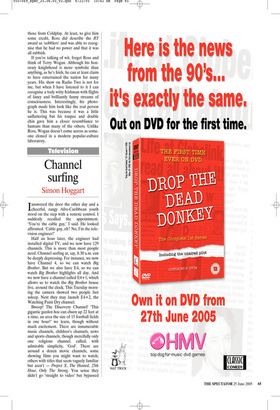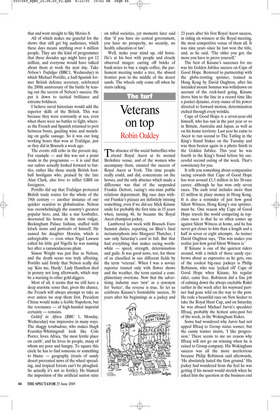Channel surfing
Simon Hoggart
Ianswered the door the other day and a cheerful, rangy Afro-Caribbean youth stood on the step with a remote control. I suddenly recalled the appointment. ‘You’re the cable guy,’ I said. He looked affronted. ‘Cable guy, eh? No, I’m the television engineer!’ Half an hour later, the engineer had installed digital TV, and we now have 129 channels. This is more than most people need. Channel surfing at, say, 8.30 a.m. can be deeply depressing. For instance, we now have Channel 4, so we can watch Big Brother. But we also have E4, so we can watch Big Brother highlights all day. And we now have a channel called E4+1, which allows us to watch the Big Brother house live, around the clock. This Tuesday morning the camera showed two people fast asleep. Next they may launch E4+2, the Watching Paint Dry channel.
Bweep! The Discovery Channel! ‘This gigantic garden hoe can churn up 22 feet at a time, an area the size of 15 football fields in one hour!’ we learn, though without much excitement. There are innumerable music channels, children’s channels, news and sports channels, though mercifully only one religious channel, called, with admirable simplicity, ‘God’. There are around a dozen movie channels, some showing films you might want to watch; others with titles that seem vaguely familiar but aren’t — Project X, The Hunted, 25th Hour, Only The Strong. You sense they didn’t go ‘straight to video’ but bypassed that and went straight to Sky Movies 8.
All of which makes me grateful for the shows that still get big audiences, which these days means anything over 4 million people. They are the kind of programmes that three decades ago might have got 12 million, and everyone would have talked about them at work the next day. Take Nelson’s Trafalgar (BBC1, Wednesday) in which Michael Portillo, a half-Spanish former British defence secretary, celebrated the 200th anniversary of the battle by teasing out the secrets of Nelson’s success. He put it down to tactical brilliance and extreme boldness.
I believe naval historians would add the superior skills of the British. This was because they were constantly at sea, even when there were no battles to fight, whereas the French and Spanish returned to port between bouts, guzzling wine and munching on garlic sausage. So it was our long working hours that won at Trafalgar, just as they did in Brussels a week ago.
The events still echo in the present day. For example — and this was not a point made in the programme — it is said that our sailors actually looked forward to battles, rather like those sturdy British football hooligans who, praised by the late Alan Clark, also love to inflict GBH on foreigners.
Portillo did say that Trafalgar protected British trade routes for the whole of the 19th century — another instance of our quicker reaction to globalisation. Nelson was overwhelmingly the country’s greatest popular hero, and, like a star footballer, decorated his house in the most vulgar, Beckingham Palace fashion, stuffed with kitsch items and portraits of himself. He named his daughter Horatia, which is unforgivable — even when Nigel Lawson called his little girl Nigella he was naming her after a ranunculaceous plant.
Simon Wright was just fine as Nelson, and the death scene was truly affecting. Portillo said firmly that Nelson really did say ‘Kiss me, Hardy’. Lady Hamilton died in penury not long afterwards, which may be a warning to other gold-diggers.
Most of all, it seems that we still have a deep atavistic sense that, given the chance, the French will always attempt to take us over unless we stop them first. President Chirac would make a feeble Napoleon, but the resonance — of high-handed imperial certainty — remains.
Geldof in Africa (BBC 1, Monday, Wednesday) was impressive in many ways. The shaggy troubadour, who makes Hugh Fearnley-Whittingstall look like Cole Porter, loves Africa, ‘the most fertile place on earth’, and he loves its people, many of whom are poor and hungry. To square this circle he has to find someone or something to blame — geography (tracts of sandy desert prevented news of the wheel spreading, and tropical forests can’t be ploughed. So actually it’s not so fertile). He blamed the imposition of the artificial nation state on tribal societies, yet moments later said that ‘if you have no central government, you have no prosperity, no security, no health, education or law’.
Well, make your mind up, old horse. He’s at his best with people and closely observed images: carting off bricks of bank-notes to buy a single coffee, the parliament meeting under a tree, the absurd frontier post in the middle of the desert sands. The wheels only come off when he starts talking.



































































 Previous page
Previous page